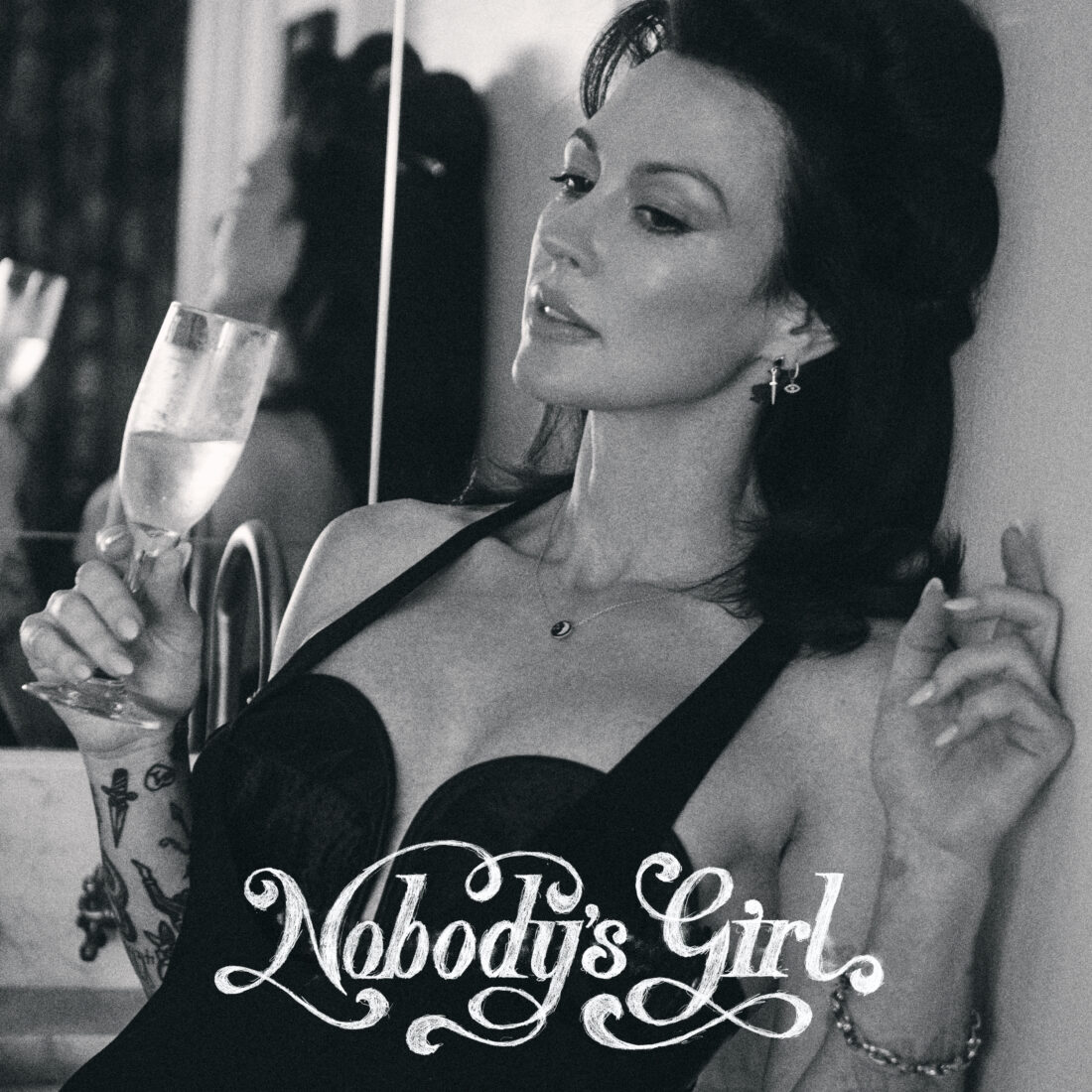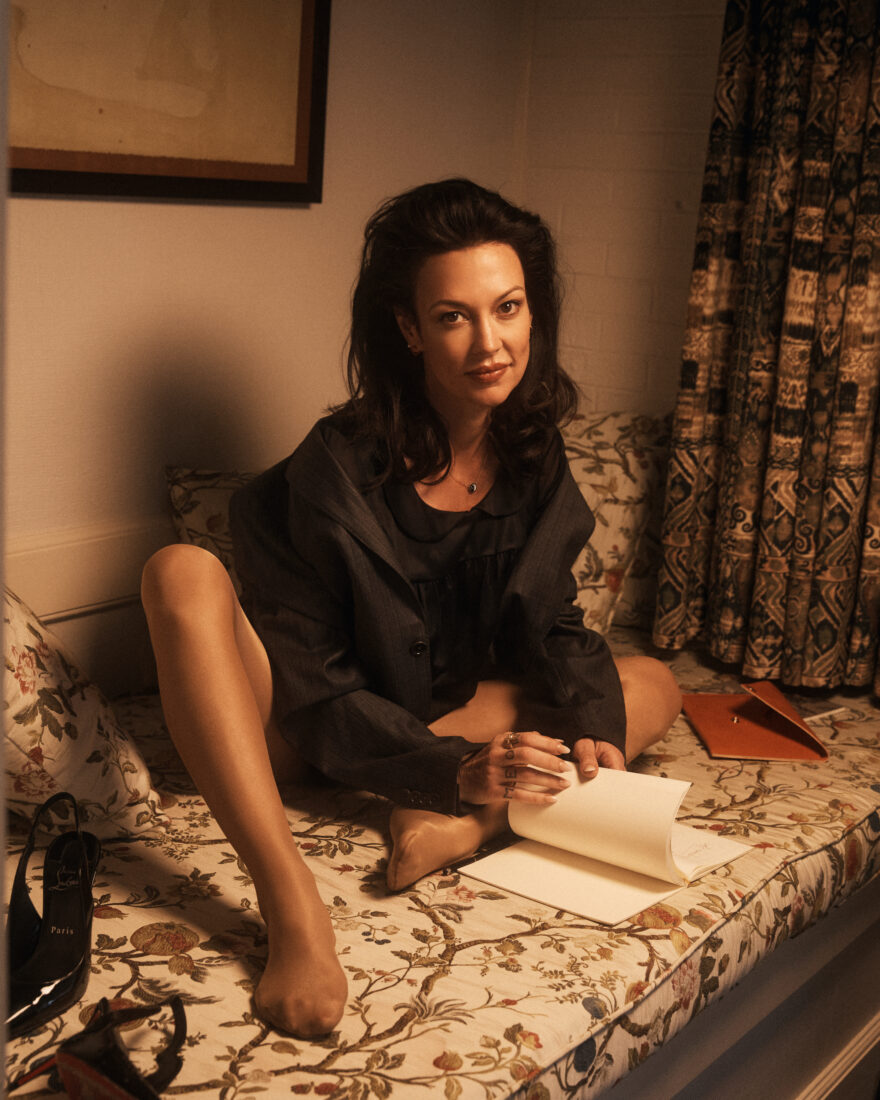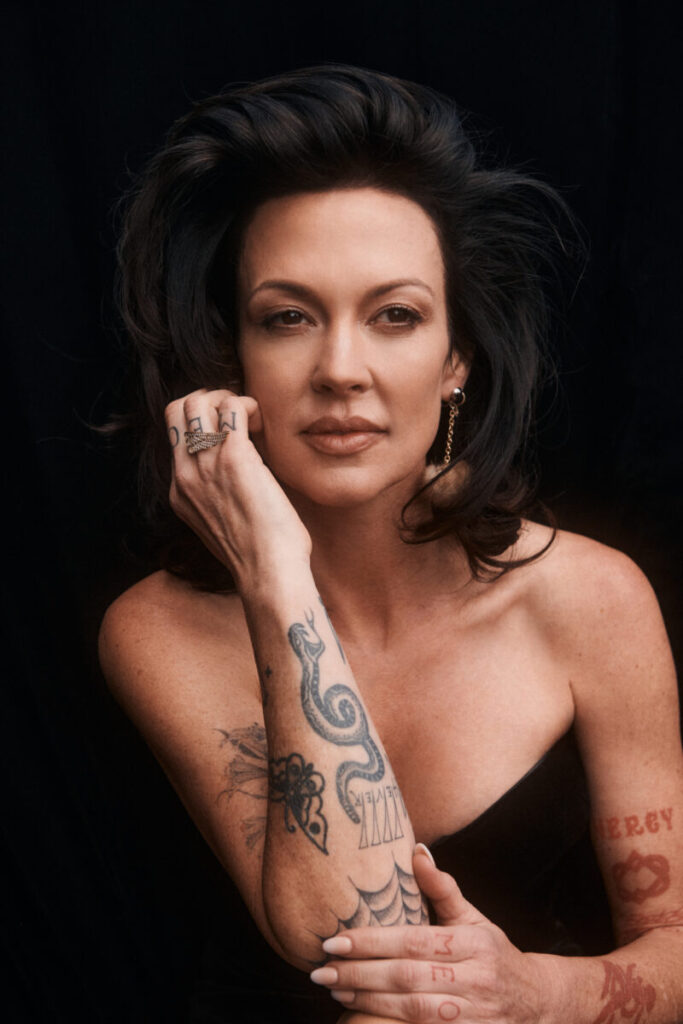For Amanda Shires, the compulsion to create music can be physical. “It usually starts with a kind of weight on your chest,” she tells G&G, calling from her home in Nashville as she prepares to kick off her fall tour. “It feels kind of like you’re bundled up and about to go into a snowstorm. I’ll feel that feeling and think, Okay, it’s time to sit down and write a song.”
With the release of her new album, Nobody’s Girl, set for September 26, Shires should be feeling a little lighter. In the wake of a grueling year that brought the finalization of her divorce from fellow musician Jason Isbell, the death of her father and grandmother, and more recently a car accident that supplied physical bruises to match the emotional ones, the thirteen-track collection chronicles all she has carried—the anger and longing, numbness and exhaustion, awe and hope. With the support of producer and friend Lawrence Rothman, she wrote the songs for no one but herself, but in their soul-baring specificity they pluck at universal heartstrings. “It’s not an instruction manual,” she explains. “It’s a companion if you’re going through hard things.”
While the divorce obviously inspired much of the record, anyone hoping to rubberneck at her relationship with Isbell will find more to parse in her previous release, 2022’s Take It Like a Man. As its name implies, Nobody’s Girl is Shires’s journey alone, one that finds her digging out of the wreckage. If she hurls a few lyrical daggers her ex-partner’s way, they’re blunted by more wistful moments that together support an idea she posits in the album description: “Heartbreak isn’t just one feeling,” she writes. “It’s a storm that keeps changing.”

Musically, that storm can take the shape of a lush instrumental overture (“Invocation”), ruminative folk (“Lose It for a While”), fiery rock (“Piece of Mind”), or an old-school country ballad (“Streetlights and Stars”). In the way she often pairs a tremulous verse with a soaring chorus, Shires can sound a lot like Dolly Parton, though she’s also an accomplished fiddle player with an appetite for sonic experimentation and an MFA in poetry.
The latter is evident in the album’s vivid imagery (“I dropped my open bottle of red wine in the snow / Ran out of my hands like it had planned to go”) and frequent nods to the natural world. Shires has long looked to birds for inspiration; the hook for the ethereal “A Way It Goes” appears to lament the end of a romance—“It just takes off, and up and away love goes”—until the third time she sings it, when it swells into something more hopeful.

Below, read our interview with Shires on motherhood, creative catharsis, and her favorite placeholder lyric. Nobody’s Girl is available for pre-order here.
The album’s first full-length track, “A Way It Goes,” is a song your producer, Lawrence Rothman, has said “plays like a movie.” If this is a movie, it’s clearly in the third act. Tell us about the decision to take the listener straight to the bottom of the well with you.
That was one of the later songs I wrote for the record, but I felt like it encapsulated the end of something and also a beginning. The main concepts of the record all relate back to that song. Usually you find the anchor to a record early on in the process, but I guess this was like when you’ve been through the desert and finally find some water.
You credit Rothman for helping you get there.
Lawrence has a way of seeing a person and the need to, you know, write your way through it. They forced me to write even when I was absolutely certain I had written enough songs already.
Did you have a listener in mind when you wrote these songs?
I wrote them all—some in parts and some all at once—as a way of working through my feelings and experiences, and if people want to listen to them, that’s cool. But I don’t usually write with anything like that in mind because I feel like it clouds the creativity or the instincts that come off the page. If you write like that, it starts to dilute everything.
One of the songs I found most moving, maybe ironically because it’s about a lack of emotion, is the closing track, “Not Feeling Anything.” Why did you want to end with that one?
Well, I loop the album, so for me it doesn’t really ever end, it just cycles back to the beginning. But in putting that last, I was saying you get to a point where you are either numb or hardened or in a place of accepting, or a tangle of all those things, and maybe that numbness helps you navigate. You can only be in the ocean so long before you see land.
When you write songs, do you start with words or music?
So I do words every day, and there will be things I’ll hold onto that I don’t realize I’m working on, that keep recurring in the writing. And I’ll have pieces that I keep around, trying to figure out what they’re for, just because they’re interesting to me or I feel they deserve further reflection.
Either way I’ve got to have an instrument in my hand, whether it’s violin or ukulele or tenor guitar. And the words I usually sing first are “meow meow,” because you can’t just have all the words all at once—you’ve got to find a melody—and I’m not a person that does “do” or “la.” You know [the Beatles’] song “Yesterday, all my troubles seem so far away”? Those words started out as “scrambled eggs.” And I don’t want that to be any kind of my history—that where there were nonsense words there were breakfast foods [laughs].
What songs from the album are you most looking forward to playing live?
It depends on the mood of the day, but I look forward to playing “Living,” and I really look forward to playing “Friend Zone,” ’cause it’s a little bit of lightness when it comes to all the heavy material we have here. I also really like the rock-and-roll jam “Piece of Mind” because it has blazing guitars—it reminds me of Thin Lizzy—and a good key for fiddles. That’s a good thing about having my own band—I don’t have to play in keys that are sorry for fiddles.
I imagine at this point you’re used to playing very personal songs live, but how do you cope with that? Do you find yourself emotionally drained after each show?
I’ve just had to get used to the fact that sometimes the feelings are bigger and hit harder on some nights than others. So I have to forgive myself if I almost cry, or pretend I’m not going to cry and wince in pain like something happened [laughs]. But I just go through it and do it. If I was to actually feel like I was having a hard time going through it, I would just tell folks, but I haven’t had to do that yet.
But I don’t find it draining either. I think that’s a bunch of bullsh*t. We get to go through life doing a job we care about and getting to live a life of art. I feel lucky, grateful, and sometimes invigorated to the point that I can’t sleep because connection is a good feeling for me. Sometimes you wish you could bottle that up and take it with you to the many days when you don’t have that feeling.
Can you talk a bit about balancing motherhood with all of this—not just the divorce but also the grind of the job? You wrote in the album description that your record wasn’t about freedom, that “most women I know, especially mothers, aren’t free.”
I’m grateful for folks like Bobbie Nelson [Willie Nelson’s late sister, with whom Shires collaborated on 2023’s Loving You], who made it possible that we single women don’t get our children taken away because we’re playing in bars. You know, those kinds of things happened, and I’m glad that’s not the case now. It doesn’t make it any more equal, but hopefully we’ll get to that place in the future, and we’re not going to get there if we all don’t continue to try and have our careers in these times.
I just wanted [my daughter] to see that even if your personal life is falling apart and your heart’s broken and the world’s broken, you can still make some art. Make something pretty or beautiful or a chaotic beautiful mess—whatever it is, you can make something out of it.
Speaking of Bobbie Nelson, there’s just something special about your voice with her piano. Did that collaboration change your feelings about that instrument?
She really had it—the music poured out of her. But yes, I’ve become a really big piano lover. I used to love the steel guitar, but over the years the piano has become just the most glorious thing. It must be nice to be a piano player. Although I don’t envy their load-in. The lucky ones play the harmonica.
Elizabeth Florio is digital editor at Garden & Gun. She joined the staff in 2022 after nine years at Atlanta magazine, and she still calls the Peach State home. When she’s not working with words, she’s watching her kids play sports or dreaming up what to plant next in the garden.


Comments are closed.